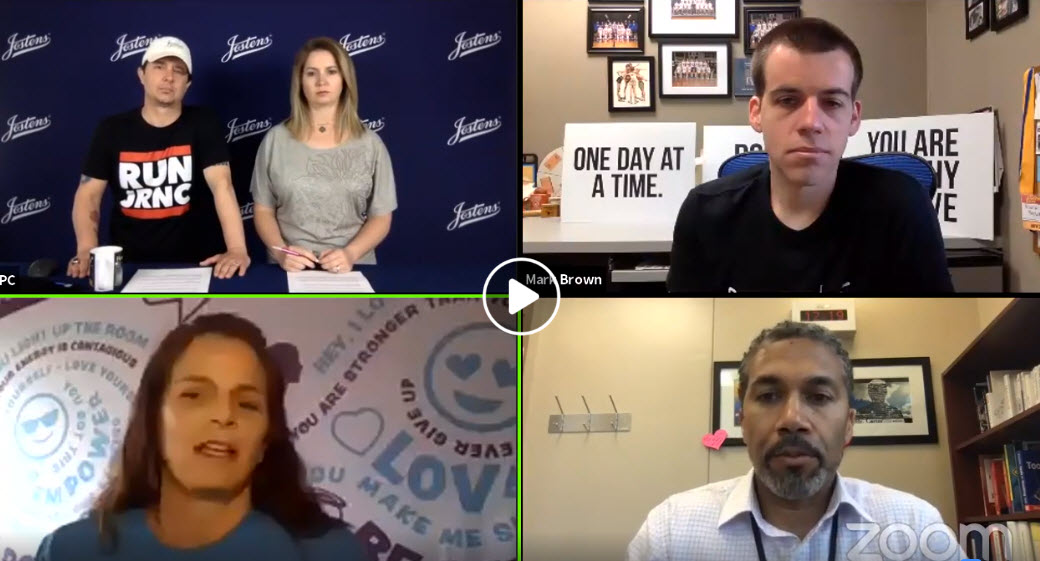Part of the Virtual Culture and Climate Series – Spring 2020
Featuring an interview with three guests in a Facebook Live presentation on May 18, 2020.
Congratulations to our graduates! Most schools are in the home stretch now, so this will be our last Motivation Monday episode. Since it’s Mental Health Awareness Month, today is all about mental health and how we need to pay special attention to how our staffulty and students are doing in this challenging environment.
We’re going to hear from three educators about their perspectives on mental health issues:
Mark Brown is an Assistant Principal at Newberg High School in Oregon. He is sharing his struggles with anorexia to bring hope to others who are struggling, and show them that acknowledging a problem and reaching out for help are healthy ways to cope.
Dwight Carter is an Assistant Principal in Ohio who speaks openly about battling with depression (check out his RenTalk presentation at JRNC 2019 here) and how despite the stigma of counseling in African American culture, it has helped him be aware of patterns and focus more on his core values.
Kim Karr is a former teacher and cofounder of #iCanHelp, a group working to educate students on how to be Digital First Responders and take action to keep social media kind. (See Harbor Season 2, Episode 8, Matt Soeth.) They are working with www.work2bewell.org to help teens take better care of themselves and others.
Key Points:
- To remove the stigma so students know it’s OK to seek help, you need to make mental health a part of regular conversations in the schoolhouse, not just the focus of an overwhelming week of heavy topics. Newberg HS has a wellness center with a positive focus and careful language so students feel safe going there and sharing. Also need to train and empower staff to handle difficult conversations and lead by making themselves vulnerable.
- Need to pay particular attention to how we treat and talk about men, who are viewed by our culture as “soft” if they show emotion other than anger.
- The African American community has a general distrust of the medical field, so bringing in people of color in that profession to talk about it can break down barriers. Prepare staff to emphasize with students in need. “Create pathways for emotion to occur, without shame.” – Dwight Carter
- Don’t focus on bullying; present looking out for others as something everyone can do, and tell students how to do it. Encourage parents to understand what their kids are doing online – this free online course for parents can help.
- As we return to school, it’s critical we keep the spotlight on relationships, despite pressure to focus on learning gaps. Need to harness the energy of the first few days of school so it feels like a family reunion, and make relationships part of the routine, not the exception. Ask several times how others are doing, to try to get real answers. Focus more on feedback than grades, and that creates conditions for relationships to occur. Then apply the 5 R’s – recognize the routines and behaviors, reward them, and recognize the connections, and that will increase the results. Make 5 R’s systemic to the organization, and then won’t matter if you’re face-to-face or digital.
- Social Emotional Learning boils down to PC’s mantra: Everyone needs to hear “I see you, I hear you, and I love you.” Even if you haven’t struggled personally (to connect with your story), you can do these things, and don’t wait for them to invite you to do these things.
We’re not experts, but we know a lot of people who are. Teachers: we took an upper cut right off the bell, but we got up off the mat and we’re back in this thing. Stay patient, stay kind, and stay healthy.
Other Resources
Coping Strategies – This lesson from the Jostens Renaissance Leadership Curriculum provides several activities to use with students to explore different ways people cope with challenges and how to find more healthy ways to cope.
This is the final installment of the Virtual Culture and Climate Series. Email Renaissance@jostens.com with questions or suggestions for resources.

